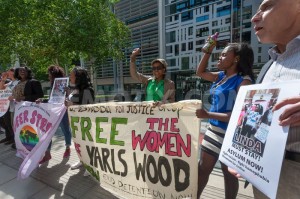London again: a protest calling for an end to deportations to Uganda of known lesbians who face death if returned there.
Around 20 protesters from Queer Strike (part of the Global Women’s Strike movement) and the Movement for Justice protested this afternoon against the deportations of gay asylum seekers to countries such as Uganda, where gays are persecuted and even killed.
The protest came months after lesbian Jackie Nanyonjo died following injuries inflicted on her during her forced deportation by thugs contracted to the UKBA in March, and a single day before flights are due to return Linda N on Qatar Airways and Josephine by Royal Air Maroc.


People’s ability to obtain refugee status rarely depends on need and more about relations between the two countries.
In the 1980s and 1990s, the US did what China does to North Koreans today. It captured refugees and knowingly sent them back to their deaths in oppressive pro-US regimes like El Salvador, Haiti and Guatemala.
Governments are still actively trying to deny refugee status to women who want to avoid Female Genital Mutilation, arguing it will “open the floodgates for refugees” or “it’s not a life or death issue”.
http://www.forwarduk.org.uk/key-issues/fgm/fgm-asylum
Wealth often has a lot to do with who gets to stay, not life or death (re: Rupert Murdoch buying his way to the front of the immigration line in the US). Countries rejected people who tried to escape Hong Kong in 1997 except for the wealthy. Governments actively tried to prevent middle class people from having “anchor babies” and citizenship gained through them.
Thank you for writing about this, Ophelia. The immigration enforcement system is horrifying. People who come here to seek asylum are often held in hellholes like the infamous Yarl’s Wood detention centre: some are held on the “Detained Fast Track” while their claims are processed, with barely any opportunity to gather evidence and make their cases. There is a culture of disbelieving asylum-seekers and denying them dignity.
Things are particularly terrible for LGBT asylum-seekers, who are subjected to demands to “prove” their sexuality or gender identity.
Then there’s also the deeply racist culture in the UKBA. The guards who killed Jimmy Mubenga in 2010, working for private security contractor G4S, had racist jokes on their mobile phones.
And these are the people making decisions about asylum cases:
Asylum-seekers can appeal to the First-tier Tribunal, but tribunal judges are often no better.